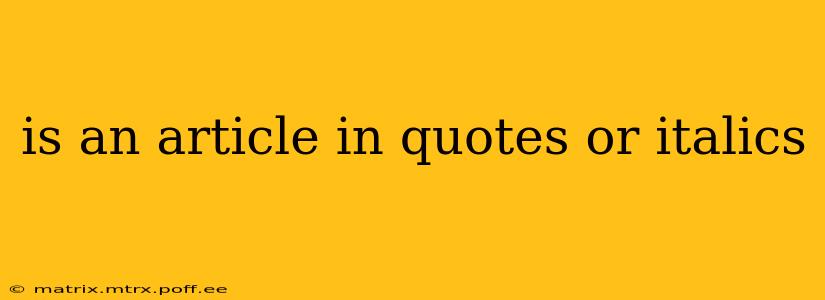Whether an article is in quotes or italics depends entirely on the context and the reason for setting it apart from the surrounding text. There's no single rule. Here's a breakdown of when you'd use each:
When to Use Quotation Marks (" ")
Quotation marks are primarily used to indicate direct speech or a quote from another source. This means you're reproducing someone else's exact words. For example:
- "To be or not to be, that is the question," mused Hamlet.
- The article stated, "The economy is expected to grow by 2% next year."
Quotation marks can also be used to:
- Set off titles of shorter works: This includes song titles, short stories, poems, and articles within a larger publication (like a magazine or newspaper). For example: "Ode to a Nightingale" or "The Impact of AI on Healthcare." Note that longer works like books or albums usually get italicized (see below).
- Show irony or sarcasm: This is less formal and uses quotation marks to highlight a word or phrase's unexpected or contradictory meaning. For example: He was a "brilliant" strategist whose plans always failed.
When to Use Italics (* or _ )
Italics are used for a wider range of purposes, often to give emphasis or to distinguish certain elements of text:
- Titles of longer works: This includes books, plays, films, albums, and the names of newspapers and magazines. For example: To Kill a Mockingbird, Hamlet, The Dark Knight.
- Emphasis: Italics can highlight a word or phrase to draw attention to it. For example: The most important factor is consistency. However, overuse of italics can weaken their impact.
- Foreign words and phrases: Unless the foreign words have become commonly used in English (like "ad hoc"), they're often italicized. For example: coup d'état, schadenfreude.
- Scientific names: The scientific names of plants and animals are usually italicized. For example: Canis familiaris (domestic dog).
- Words or phrases being defined or discussed as words: This is to separate the word itself from its meaning. For example: The word syzygy refers to a straight-line configuration of three celestial bodies.
In Summary:
The best way to determine whether to use quotes or italics is to consider the context and purpose. If you are directly quoting someone, use quotation marks. If you are emphasizing a word, denoting a title of a longer work, or highlighting a foreign word, italics are generally the better choice. Consistency in your style is also key.
